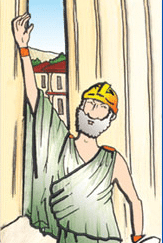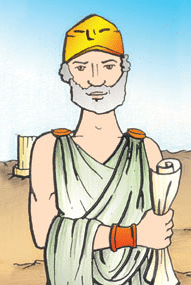Pericles
Every year, for 15 consequent years the Athenians were voting him to be the leader of their city. He was born in Athens around 495 BC into a wealthy family. His mother was related to Cleisthenes and his father was a famous general who fought against the Persians. We know very little about his earlier years accept that he most certainly left shortly from Athens during the battle of Salamis, when the generals led by Themistocles urged the immediate evacuation of Athens. He was educated by famous philosophers of his time. In 472 BC he became famous when the play he had sponsored by the playwright Aeschylus called “The Persians “ won first prize.
In 461 BC he took his first major steps in politics by aliening himself with another politician named Ephialtes. Together they quashed the powers of the old noble council. After Ephialtes was assassinated, and with the banishment of Cimon, who was his chief political adversary, he assumed the leading position in the state. For the next ten years he led several military and naval expeditions that led to unprecedented outward expansion of Athenian power. After the setting up of the naval alliance called the Delian League a peace treaty was signed with Persia.
In 451 BC Pericles pioneered radical changes to Athenian democracy. He introduced the policy of payment from the public treasury for state services such as jurymen and he limited citizenship to only those of Athenian parentage on both sides.

His own personal life came under scrutiny. After he divorced his wife, with whome he had two sons, he lived openly with Aspasia, the beautiful and intelligent foreign courtesan. Even more scandalous was his treatment of her as an equal during a strictly period of exclusively men dominated society. Eventually they married and she give birth to another son.
Pericles nicknamed “The Olympian” was legendary for his oratory skills. He was a patron of the arts and under his leadership the period became known as “The Golden Age”, with Athens reaching new peaks of power, culture and glory. When the treasury of The Delian League was transferred from Delos to Athens he used this opportunity in 471 BC to obtain support for the realization of his most ambitious dream, the building of the Parthenon temple in honor of the goddess Athena. He personally placed in charge of the project his friend Phidias for the adornment of the temple with unique sculptures. In 431 BC, sensing jealousy and resentment from neighboring states he urged the assembly to declare war on Sparta. Citizens were advised to seek shelter within the safety of the city walls and fleets of ships were planned to bring in supplies. In 430 BC one year into the war he gave his famous ‘Epitaph “ speech for the dead soldiers:

His own personal life came under scrutiny. After he divorced his wife, with whome he had two sons, he lived openly with Aspasia, the beautiful and intelligent foreign courtesan. Even more scandalous was his treatment of her as an equal during a strictly period of exclusively men dominated society. Eventually they married and she give birth to another son.
Pericles nicknamed “The Olympian” was legendary for his oratory skills. He was a patron of the arts and under his leadership the period became known as “The Golden Age”, with Athens reaching new peaks of power, culture and glory. When the treasury of The Delian League was transferred from Delos to Athens he used this opportunity in 471 BC to obtain support for the realization of his most ambitious dream, the building of the Parthenon temple in honor of the goddess Athena. He personally placed in charge of the project his friend Phidias for the adornment of the temple with unique sculptures. In 431 BC, sensing jealousy and resentment from neighboring states he urged the assembly to declare war on Sparta. Citizens were advised to seek shelter within the safety of the city walls and fleets of ships were planned to bring in supplies. In 430 BC one year into the war he gave his famous ‘Epitaph “ speech for the dead soldiers:
“The men who died were not all heroes, but by their death they have made up for their short comings. I know that for love of Athens they were glad to do so. They were all alike, swept away from a world filled for their dying eyes not with terror, but with glory”…
Not long later a disastrous plaque swept over the densely populated inner walls, killing approximately 80,000 including Pericles’ sons from his first marriage. In vain he tried to revoke the citizenship law, to have his only surviving son declared his inheritor. But by now the city that he loved had turned against him. In court he was blamed and heavily fined. The assembly voted to strip him from office and immediately dispatch a delegation to Sparta to seek peace. However the people rallied behind Pericles and he was soon reinstated. By now he too had fallen victim to the cursed plaque and in 429 BC the great statesman died.











